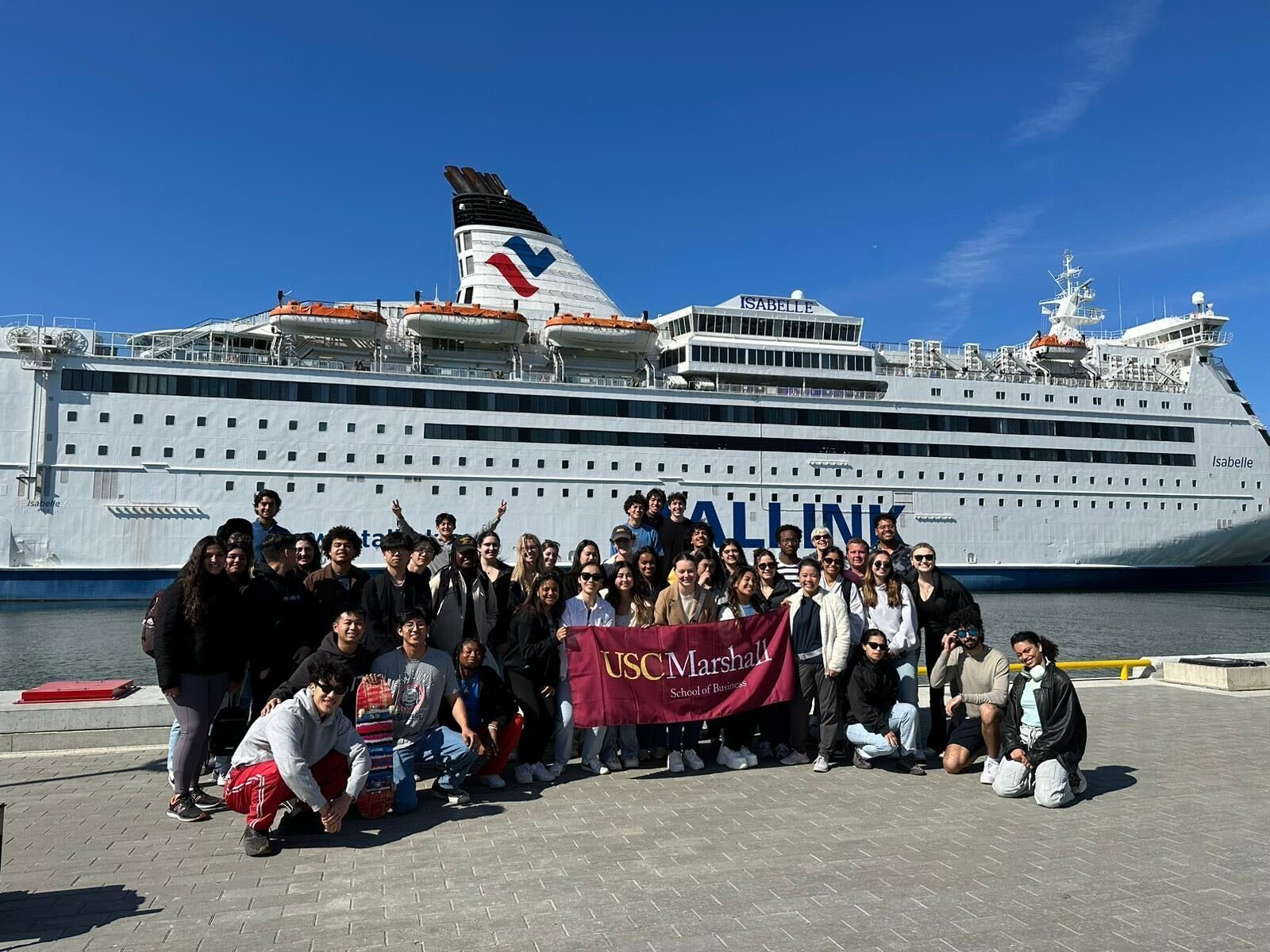Study Abroad
Whether hopping on the Tube, catching a bus, or taking a train beyond the city, knowing how to navigate London’s transport like a local can make your journey smoother and stress-free. Here are some key tips to help you master the system.
London is an incredible city, but sometimes a quick getaway can be the perfect way to explore more of what the UK offers. Fortunately, there are plenty of charming towns, historic landmarks, and stunning countryside destinations within a short train ride from the capital. Here are some of the best day trips from London that you can reach in under two hours.
I studied abroad at Maastricht University in the Netherlands, and it was a huge culture shock! From the Dutch food to the public transportation to the cold weather, there was a lot to adjust to. One of the biggest changes was the university itself. Maastricht University uses problem-based learning (PBL), where students work in small groups to solve complex, real-world problems. This was a major shift from USC, where I was used to large lecture halls and scantrons. As someone who is comfortable speaking up in class and working in groups, I was eager to try out this new approach. So, is problem-based learning the future of education? Here's my take.
When asked, “What was your favorite part of college?” many tend to say study abroad. In general, travel is a learning experience, but when mixed with studying, it offers even more enrichment opportunities. While not everyone is able to study abroad in college, I highly recommend looking into Maymester options that allow you to travel to another country for one to two weeks with your USC peers while focusing on a specific aspect of your educational journey. Studying abroad and Maymester options range across most continenst and often are linked to USC’s partner universities. Here are some of USC’s best and most popular study abroad programs.
A year ago today, I was studying abroad at the University of Edinburgh in Scotland, gallivanting across different countries in Europe on the weekends and spending time with the incredible friends I made through the program on the weekdays. It was an incredible experience to say the least, and I have an immense nostalgia and longing to go back in time and relive those adventures all over again. While the experience itself was magical, getting approved to go to Edinburgh was a complicated process.
While finally figuring out your study abroad plans is exciting, there’s also a fair bit of stress as the idea becomes a reality. One of the most common causes of this stress is packing. Whether you’re studying abroad for one month or six months, it can be quite challenging to assess which items you’ll absolutely need and what’s a waste of precious suitcase space. Here are a few must-haves and tips to help you pack for your time studying in a new country.
Before coming to USC, I knew I wanted to travel abroad during college, whether that be a personal trip, a semester abroad, or an internship. About half way through the fall semester of sophomore year, my transfer advisor notified me of the TIE program. I was definitely hesitant at first and did not know what to expect, but I decided to attend the info session to see what it was all about.
My experience studying mythology, ancestry, and oral traditions in Greece through the USC Julymester program was a profound and unforgettable journey. In preparation for the trip, we had a number of meetings to discuss course content and class materials. We were assigned various readings and podcasts to complete ahead of time to prepare for the course and the trip. Having previously taken a Greek mythology class, this opportunity allowed me to deepen my prior knowledge while immersing myself in the culture and surroundings of where these myths were formed.
While a traditional study abroad program might not fit into your course plan, especially if you’re a transfer student or decided on a major late, there are still a number of paths USC offers to learning outside of LA in the US or abroad. These course options that only account for one class from your fall or spring semester have less of an impact on your regular semester schedules, or if it’s an internship pathway, it might have no impact at all on your course plan. If you have the travel itch, don’t let university bureaucracy get in the way.
By: Aedan Henry ’24 (USC Student Life Guest Blogger)
USC’s fantastic study abroad programs are one of the reasons that I chose the university. I had the opportunity this Spring to go to London through my Communication major at Annenberg, so I decided to finally take the leap. It’s my first time traveling outside of North America, and it’s been an absolute blast so far. If you’re considering studying abroad in a future semester, here’s what the day-to-day of the experience looks like for me and why you should try it yourself.
By: Hannah Skinner ‘23
It’s the little details about daily life in Seoul that I liked the most. I miss the street food vendors and their warm snacks during the winter. I miss the long escalators down into the clean subway stations. I miss the charming streets lined with cafes, skincare stores, and cozy restaurants. To me, every street was charming. But I think when you are living in a world so far away from what you’ve grown up with, you’re more likely to see the beauty in simple things.
By: Hannah Skinner ‘23
Studying abroad will already be one of the most enriching experiences you have as a student, but there are ways to add even more value. Looking back at my experience at Yonsei University in Seoul, South Korea, I felt like I adequately prepared myself to go abroad, but there was still plenty I learned along the way. Here’s some tips I implemented that helped me make the most of my time in South Korea.
By: Hannah Skinner ‘23
Thursday, September 8 was the Study Abroad Fair, and Trojans360 is bringing you a summary of events if you missed it!
By: Hannah Skinner ‘23
It was always a dream of mine to study abroad, and today, I am finishing up the last parts of my application and am on track to leave in the spring semester! The application process is long and can be a bit daunting, so here is a breakdown of my personal experience.
By: Ellice Ellis ‘20
The 2019 QS, Best Student Cities Rankings, have been published, and once again, London has been ranked as the best city for study abroad students in 2019. And from first-hand experience, I know London is a great city to travel, learn, and break out of your comfort zone.
By: Sophia Pei ‘22
Stressed out because you aren’t doing anything productive this summer? Want to study abroad in China? Want to do research on climate change and its impact on the ocean? Check out USC’s Problems Without Passports course BISC-499: Our Future Changing Ocean. Due to a recent last-minute student dropout, we need at least one more student for this course to continue. As someone who is really passionate about environmental conservation, I would really love for this course to continue. If you’re interested please keep reading!
By: Ann Nguyen ‘22
So, you didn’t get that summer internship you were hoping for… that’s okay! There are plenty of other things you can do to make your break worthwhile. Whether you’re a freshman, like me, who thinks the sky will fall if you don’t find some last-minute summer dream job or a rising senior looking for one last great resume-building experience before you graduate and step into the real world, don’t fret because I have plenty of options for you.
By: Talia Walters ‘20
I want to make it clear that the “standard” study abroad options aren’t bad. The key is that your comfort zone is something that only you are able to measure, and decisions based off of that are yours alone. I just don’t think the image of a great, vast world filled with billions of people who aren’t the cookie-cutter USC student is well-presented to students traveling abroad.
By: Danielle Collins ‘20
When you go abroad, you’ll start to hear all the usual jokes about the “Abroad 15.” And to be honest, you might put on a pound or two. I mean, let’s face it, there’s a whole world of new foods to try. But that doesn’t mean you should completely let yourself go. Here are some tips to stay healthy, physically and mentally, while abroad.
By: Danielle Collins ‘20
In my opinion, study abroad opportunities are one of the best parts of going to USC. I’m currently studying abroad in Madrid, Spain and absolutely LOVING it! If you’re considering study abroad, it can be daunting to decide where to go. There are so many amazing places to choose from…how can you be sure you pick the right place for you? Read on to find out!
By: Jamie Wu ‘18
For the third consecutive year, the Academic Honors & Fellowships office hosted their annual USC Research and Fellowships Week. The office is committed to educating the USC community about university awards and nationally competitive fellowships. That’s why during this week-long session, students were able to learn about different research and scholarship opportunities available to them at USC and nation-wide. Although some programs are aimed at upperclassmen and graduate students, there are multiple scholarships available to underclassmen as well! Here are the top 5 that every student should apply for!
By: Jamie Wu ‘18
One of the biggest regrets that college seniors always have is not studying abroad. I didn’t truly understand why until I studied abroad at the National University of Singapore in the Spring of 2017. Living abroad for 4 months was the best decision of my college career. I know that puts a lot of weight to my words but I genuinely cannot recommend studying abroad enough (and especially in Singapore). And these are the top 5 reasons why.
By: Adriana Bernal Martinez ‘20
I remember the day I got this little red and yellow box in the mail. It was in late March of my Senior year of high school. I was coming back home from Debate practice at around 6 and at the sight of two little boxes just chillin’ on my doorstep, my breath caught in my throat. I wasn’t really sure what they were about whatsoever, but they seemed rather important and they had the colors of the school I had just committed to on them, so. I was anxious and excited and maybe a little teensy bitsy sweaty but upon opening them, I learned one thing and one thing only: I was going to China.
By: Anna Lipscomb ‘19
It’s never too early to start planning for the summer. If you’re not sure where to start, here are a few resources and opportunities available to help you.
By: Rachel Bennett ‘18 and Ayman Siraj ‘18
As the sun set at the heart of the island, we were welcomed to a feast. In the middle of the Tahitian jungles, local men and women pulled colorful foods from a traditional earth oven set deep into the ground.
By: Grace Carballo ‘17
My friends keep asking me if it’s weird to return to USC after two semesters and a summer program abroad and the answer is a resounding “Yes!” A lot of other folks who were abroad have had similar experiences of reverse culture shock. I saw a line down the bookstore steps and decided to order my textbooks online only to discover later that my peers were in fact waiting for $6 cupcakes to be dispensed from an ATM.
By: Anna Lipscomb ‘19
There is something about being abroad - whether it’s for a few days or a few months - that changes the way you view the world. It’s the new sights, sounds, smells, and experiences you encounter every moment that stick with you and constantly remind you that there is always more to explore.
By: Grace Carballo ‘17
It’s important that you know, both for accuracy of pronunciation and the sake of the rhyme scheme that Jujuy is pronounced “Hoo-hooey”. And our road-trip through the northern part of this province in Argentina was nothing short of breathtaking.
By: Grace Carballo ‘17
When you’re thousands of miles away from home, everyday annoyances can seem like serious dilemmas, especially when they’re harder to solve in a country you aren’t as familiar with. It’s upsetting but not the end of the world when your laptop malfunctions at USC or your credit card gets lost or canceled, but when you’re several countries away from the nearest Apple store and your bank has no branches in your host country, it can be fairly terrifying to say the least. It happens to everyone at some point or another and just like that, the honeymoon phase is over.






























Studying abroad is often described as a once-in-a-lifetime experience filled with adventure, personal growth, and unforgettable memories. But what people don’t always talk about is the culture shock that can come with it.